Latest Sheet Music
Tchaikovsky

Pyotr Il'yich Tchaikovsky (May 7 1840 â November 6 1893) was a Russian composer of the Romantic era. While not part of the nationalistic music group known as "The Five", Tchaikovsky wrote music which, in the opinion of Harold Schonberg, was distinctly Russian: plangent, introspective, with modally-inflected melody and harmony.
Aesthetically, Tchaikovsky remained open to all aspects of Saint Petersburg musical life. He was impressed by Serov and Balakirev as well as the classical values upheld by the conservatory. Both the progressive and conservative camps in Russian music at the time attempted to win him over. Tchaikovsky charted his compositional course between these two factions, retaining his individuality as a composer as well as his Russian identity. In this he was influenced by the ideals of his teacher Nikolai Rubinstein and Nikolai's brother Anton.
Tchaikovsky's musical cosmopolitanism led him to be favored by many Russian music-lovers over the "Russian" harmonies and styles of Mussorgsky, Borodin and Rimsky-Korsakov.
Nonetheless he frequently adapted Russian traditional melodies and dance forms in his music, which enhanced his success in his home country. The success in St. Petersburg at the premiere of his Third Orchestral Suite may have been due in large part to his concluding the work with a polonaise. He also used a polonaise for the final movement of his Third Symphony.
Aesthetically, Tchaikovsky remained open to all aspects of Saint Petersburg musical life. He was impressed by Serov and Balakirev as well as the classical values upheld by the conservatory. Both the progressive and conservative camps in Russian music at the time attempted to win him over. Tchaikovsky charted his compositional course between these two factions, retaining his individuality as a composer as well as his Russian identity. In this he was influenced by the ideals of his teacher Nikolai Rubinstein and Nikolai's brother Anton.
Tchaikovsky's musical cosmopolitanism led him to be favored by many Russian music-lovers over the "Russian" harmonies and styles of Mussorgsky, Borodin and Rimsky-Korsakov.
Nonetheless he frequently adapted Russian traditional melodies and dance forms in his music, which enhanced his success in his home country. The success in St. Petersburg at the premiere of his Third Orchestral Suite may have been due in large part to his concluding the work with a polonaise. He also used a polonaise for the final movement of his Third Symphony.
Jean-Claude Gianadda
Jean-Claude Gianadda, né le 8 janvier 1944, enseignant, directeur de collège à la retraite, est un auteur, compositeur et interprète français. Spécialisé dans les chants religieux, il est l'auteur de chansons chrétiennes, comme Trouver dans ma vie ta présence, Chercher avec toi dans nos vies Marie, Love, Rêve d'un monde ou Qu'il est formidable d'aimer mais surtout sa plus populaire Un ami pour inventer la route.
Traditional

traditional music
Ricardo Castro
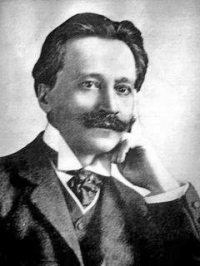
Ricardo Castro Herrera (Rafael de la Santísima Trinidad Castro Herrera) (7 February 1864 – 27 November 1907) was a Mexican concert pianist and composer, considered the last romantic of the time of Porfirio Díaz.Castro was born at Hacienda de santa Bárbara, Durango. His father, Vicente Castro, was a deputy congressman; his mother was María de Jesús Herrera. Castro began his music education with Pedro H. Ceniseros. In 1879 his family moved to Mexico City where the boy entered the National Conservatory of Music and studied piano with Juan Salvatierra and Julio Ituarte, He studied harmony and counterpoint with Melesio Morales. He finished all his studies in just 5 years, half of the usual 10. He graduated in 1883.
Mozart

Wolfgang Amadeus Mozart, full name Johann Chrysostom Wolfgang Amadeus Mozart (27 January 1756 â 5 December 1791) was a prolific and influential composer of the Classical era. His over 600 compositions include works widely acknowledged as pinnacles of symphonic, concertante, chamber, piano, operatic, and choral music. Mozart is among the most enduringly popular of classical composers, and many of his works are part of the standard concert repertoire.
Mozart's music, like Haydn's, stands as an archetypal example of the Classical style. His works spanned the period during which that style transformed from one exemplified by the style galant to one that began to incorporate some of the contrapuntal complexities of the late Baroque, complexities against which the galant style had been a reaction. Mozart's own stylistic development closely paralleled the development of the classical style as a whole. In addition, he was a versatile composer and wrote in almost every major genre, including symphony, opera, the solo concerto, chamber music including string quartet and string quintet, and the piano sonata. While none of these genres were new, the piano concerto was almost single-handedly developed and popularized by Mozart. He also wrote a great deal of religious music, including masses; and he composed many dances, divertimenti, serenades, and other forms of light entertainment.
The central traits of the classical style can be identified in Mozart's music. Clarity, balance, and transparency are hallmarks of his work.
Mozart's music, like Haydn's, stands as an archetypal example of the Classical style. His works spanned the period during which that style transformed from one exemplified by the style galant to one that began to incorporate some of the contrapuntal complexities of the late Baroque, complexities against which the galant style had been a reaction. Mozart's own stylistic development closely paralleled the development of the classical style as a whole. In addition, he was a versatile composer and wrote in almost every major genre, including symphony, opera, the solo concerto, chamber music including string quartet and string quintet, and the piano sonata. While none of these genres were new, the piano concerto was almost single-handedly developed and popularized by Mozart. He also wrote a great deal of religious music, including masses; and he composed many dances, divertimenti, serenades, and other forms of light entertainment.
The central traits of the classical style can be identified in Mozart's music. Clarity, balance, and transparency are hallmarks of his work.
Vittorio Monti

Vittorio Monti (6 January 1868 – 20 June 1922) was an Italian composer, violinist, and conductor. Monti was born in Naples where he studied violin and composition at the Conservatorio di San Pietro a Majella. Around 1900 he got an assignment as the conductor for the Lamoureux Orchestra in Paris, where he wrote several ballets and operettas, for example Noël de Pierrot.
His only famous work is his Csárdás, written around 1904 and played by almost every gypsy orchestra.
His only famous work is his Csárdás, written around 1904 and played by almost every gypsy orchestra.
Antonio Lauro
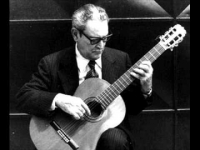
Antonio Lauro was a Venezuelan musician, considered to be one of the foremost South American composers for the guitar in the 20th century.
Chopin

Frédéric Chopin (1 March 1810 – 17 October 1849) was a Polish composer and virtuoso pianist of the Romantic period. He is widely regarded as the greatest Polish composer, and ranks as one of music's greatest tone poets.
He was born in the village of Żelazowa Wola, in the Duchy of Warsaw, to a Polish mother and French-expatriate father, and in his early life was regarded as a child-prodigy pianist. In November 1830, at the age of 20, Chopin went abroad; following the suppression of the Polish November Uprising of 1830–31, he became one of many expatriates of the Polish "Great Emigration."
In Paris, he made a comfortable living as a composer and piano teacher, while giving few public performances. A Polish patriot,
Chopin's extant compositions were written primarily for the piano as a solo instrument. Though technically demanding, Chopin's style emphasizes nuance and expressive depth rather than virtuosity. Chopin invented musical forms such as the ballade and was responsible for major innovations in forms such as the piano sonata, waltz, nocturne, étude, impromptu and prelude. His works are mainstays of Romanticism in 19th-century classical music.
He was born in the village of Żelazowa Wola, in the Duchy of Warsaw, to a Polish mother and French-expatriate father, and in his early life was regarded as a child-prodigy pianist. In November 1830, at the age of 20, Chopin went abroad; following the suppression of the Polish November Uprising of 1830–31, he became one of many expatriates of the Polish "Great Emigration."
In Paris, he made a comfortable living as a composer and piano teacher, while giving few public performances. A Polish patriot,
Chopin's extant compositions were written primarily for the piano as a solo instrument. Though technically demanding, Chopin's style emphasizes nuance and expressive depth rather than virtuosity. Chopin invented musical forms such as the ballade and was responsible for major innovations in forms such as the piano sonata, waltz, nocturne, étude, impromptu and prelude. His works are mainstays of Romanticism in 19th-century classical music.
Shakira

Shakira Isabel Mebarak Ripoll (born February 2, 1977) known simply as Shakira, is a Colombian singer-songwriter of Lebanese and European descent, musician, record producer, dancer and philanthropist who has been a major figure in the pop music scene of Latin America since the mid-1990s. She is a native Spanish speaker and also speaks fluent English, Portuguese, Italian, and some Arabic. In 2001, she broke through onto the English-speaking world with the release of Laundry Service, which sold over thirteen million copies worldwide. Shakira is the highest-selling Colombian artist of all time, having sold more than 50 million albums worldwide, according to BMI. She has also won numerous awards worldwide, including two Grammy Awards, eight Latin Grammy Awards, fifteen Billboard Music Awards, three MTV Video Music Awards, a People's Choice Award and receiving a Golden Globe nomination. She is also the only artist from South America to reach the number-one spot on the Billboard Hot 100, the Australian ARIA chart, the United World Chart and the UK Singles Chart. Additionally, she is one of the only artists to have 10 Spanish singles chart on the Billboard Hot 100.
According to the United World Chart, Shakira is as of 2008 the 4th most successful artist so far for the last decade, in terms of single sales. She is also the only artist to have two songs in the top ten of the most successful singles since 1999. Los Angeles Times declared Shakira "the most completely adapted crossover performer in contemporary pop music".
According to the United World Chart, Shakira is as of 2008 the 4th most successful artist so far for the last decade, in terms of single sales. She is also the only artist to have two songs in the top ten of the most successful singles since 1999. Los Angeles Times declared Shakira "the most completely adapted crossover performer in contemporary pop music".
Lamb of god
Lamb of God is an American heavy metal band from Richmond, Virginia. Formed in 1994 as Burn the Priest, the group consists of bassist John Campbell, vocalist Randy Blythe, guitarists Mark Morton and Willie Adler, and drummer Art Cruz.
J O S E F F I L T S C H
József Filtsch (December 27, 1782 - January 16, 1860) was a Lutheran pastor from Augusta.
His careerSon of Thomas Filtsch, pastor of Selindek. He studied at the University of Göttingen in 1806. He was first a preacher in Sibiu; from here on December 16, 1808, he was called to pastor Szászváros. In October 1819 he went to Szászorbóra and in 1828 to Szászsebes as a pastor.His son, Carl Filtsch, was a favorite student of Chopin, a talented composer and pianist who died young. He himself published 15 numbered works between 1854 and 1860. L'Alouette and L'Hirondelle (Op. 5 No. 1 and No. 2) were recommended to harpist Johanna Esterházy. The text of the recommendation is "ame Madame la Comtesse Jeanette Esterházy, see Comtesse Batthiány".
His careerSon of Thomas Filtsch, pastor of Selindek. He studied at the University of Göttingen in 1806. He was first a preacher in Sibiu; from here on December 16, 1808, he was called to pastor Szászváros. In October 1819 he went to Szászorbóra and in 1828 to Szászsebes as a pastor.His son, Carl Filtsch, was a favorite student of Chopin, a talented composer and pianist who died young. He himself published 15 numbered works between 1854 and 1860. L'Alouette and L'Hirondelle (Op. 5 No. 1 and No. 2) were recommended to harpist Johanna Esterházy. The text of the recommendation is "ame Madame la Comtesse Jeanette Esterházy, see Comtesse Batthiány".
Alonso Mudarra
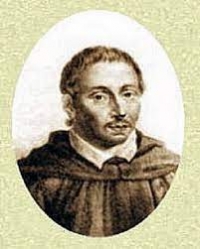
Alonso Mudarra (c. 1510 – April 1, 1580) was a Spanish composer of the Renaissance, and also played the vihuela, a guitar-shaped string instrument. He was an innovative composer of instrumental music as well as songs, and was the composer of the earliest surviving music for the guitar.
Katy Perry

Katy Perry (born Katheryn Elizabeth Hudson; October 25, 1984) is an American singer-songwriter. She has risen to prominence with her 2008 single "I Kissed a Girl" which has become a worldwide hit topping the charts in more than 20 countries, including United Kingdom, Canada, Australia, Ireland, and the United States, where it was the 1000th Billboard Hot 100 number 1. Perry has stated in the press that it's thanks to successful British singer-songwriters Amy Winehouse and Lily Allen that more female artists had been appearing on the charts. She went on to say that Winehouse and Allen "have introduced America to great music". She is known for her unconventional style of dress, often humoristic, bright in color and reminiscent of different decades, as well as her frequent use of fruit-shaped accessories, mainly watermelon as part of her outfits. Perry has a contralto vocal range.
W.A. Mozart

Wolfgang Amadeus Mozart (German: , full baptismal name Johannes Chrysostomus Wolfgangus Theophilus Mozart (27 January 1756 – 5 December 1791), was a prolific and influential composer of the Classical era. He composed over 600 works, many acknowledged as pinnacles of symphonic, concertante, chamber, piano, operatic, and choral music. He is among the most enduringly popular of classical composers.
Mozart showed prodigious ability from his earliest childhood in Salzburg. Already competent on keyboard and violin, he composed from the age of five and performed before European royalty; at 17 he was engaged as a court musician in Salzburg, but grew restless and traveled in search of a better position, always composing abundantly. While visiting Vienna in 1781, he was dismissed from his Salzburg position. He chose to stay in the capital, where he achieved fame but little financial security. During his final years in Vienna, he composed many of his best-known symphonies, concertos, and operas, and the Requiem. The circumstances of his early death have been much mythologized. He was survived by his wife Constanze and two sons.
Mozart learned voraciously from others, and developed a brilliance and maturity of style that encompassed the light and graceful along with the dark and passionate—the whole informed by a vision of humanity "redeemed through art, forgiven, and reconciled with nature and the absolute." His influence on subsequent Western art music is profound. Beethoven wrote his own early compositions in the shadow of Mozart, of whom Joseph Haydn wrote that "posterity will not see such a talent again in 100 years."
Mozart showed prodigious ability from his earliest childhood in Salzburg. Already competent on keyboard and violin, he composed from the age of five and performed before European royalty; at 17 he was engaged as a court musician in Salzburg, but grew restless and traveled in search of a better position, always composing abundantly. While visiting Vienna in 1781, he was dismissed from his Salzburg position. He chose to stay in the capital, where he achieved fame but little financial security. During his final years in Vienna, he composed many of his best-known symphonies, concertos, and operas, and the Requiem. The circumstances of his early death have been much mythologized. He was survived by his wife Constanze and two sons.
Mozart learned voraciously from others, and developed a brilliance and maturity of style that encompassed the light and graceful along with the dark and passionate—the whole informed by a vision of humanity "redeemed through art, forgiven, and reconciled with nature and the absolute." His influence on subsequent Western art music is profound. Beethoven wrote his own early compositions in the shadow of Mozart, of whom Joseph Haydn wrote that "posterity will not see such a talent again in 100 years."
Rimsky-Korsakov
Nikolai Andreyevich Rimsky-Korsakov (Russian: Никола́й Андре́евич Ри́мский-Ко́рсаков, Nikolaj Andreevič Rimskij-Korsakov, Russian pronunciation: ) (18 March 1844, – 21 June 1908) was a Russian composer, and a member of the group of composers known as The Five. He was a master of orchestration. His best-known orchestral compositions—Capriccio Espagnol, the Russian Easter Festival Overture, and the symphonic suite Scheherazade—are considered staples of the classical music repertoire, along with suites and excerpts from some of his 15 operas. Scheherazade is an example of his frequent use of fairy tale and folk subjects.
Rimsky-Korsakov believed, as did fellow composer Mily Balakirev and critic Vladimir Stasov, in developing a nationalistic style of classical music. This style employed Russian folk song and lore along with exotic harmonic, melodic and rhythmic elements in a practice known as musical orientalism, and eschewed traditional Western compositional methods. However, Rimsky-Korsakov appreciated Western musical techniques after he became a professor of musical composition, harmony and orchestration at the Saint Petersburg Conservatory in 1871. He undertook a rigorous three-year program of self-education and became a master of Western methods, incorporating them alongside the influences of Mikhail Glinka and fellow members of The Five. His techniques of composition and orchestration were further enriched by his exposure to the works of Richard Wagner.
Rimsky-Korsakov believed, as did fellow composer Mily Balakirev and critic Vladimir Stasov, in developing a nationalistic style of classical music. This style employed Russian folk song and lore along with exotic harmonic, melodic and rhythmic elements in a practice known as musical orientalism, and eschewed traditional Western compositional methods. However, Rimsky-Korsakov appreciated Western musical techniques after he became a professor of musical composition, harmony and orchestration at the Saint Petersburg Conservatory in 1871. He undertook a rigorous three-year program of self-education and became a master of Western methods, incorporating them alongside the influences of Mikhail Glinka and fellow members of The Five. His techniques of composition and orchestration were further enriched by his exposure to the works of Richard Wagner.
Czerny
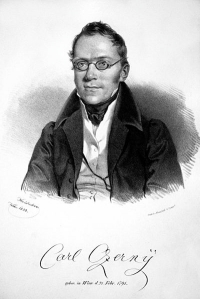
Carl Czerny (sometimes Karl; February 21, 1791 – July 15, 1857) was an Austrian pianist, composer and teacher. He is best remembered today for his books of études for the piano. Czerny knew and was influenced by the well-known pianists Muzio Clementi and Johann Nepomuk Hummel.
The Smashing Pumpkins

The Smashing Pumpkins are an American alternative rock band that formed in Chicago, Illinois in 1988. While the group has gone through several lineup changes, The Smashing Pumpkins consisted of Billy Corgan (vocals/guitar), James Iha (guitar/backing vocals), D'arcy Wretzky (bass guitar/backing vocals), and Jimmy Chamberlin (drums/percussion) for most of the band's recording career.
Disavowing the punk rock roots shared by many of their alt-rock contemporaries, the Pumpkins have a diverse, densely layered, and guitar-heavy sound, containing elements of gothic rock, heavy metal, dream pop, psychedelic rock, arena rock, shoegazer-style production and, in later recordings, electronica. Frontman Billy Corgan is the group's primary songwriter—his grand musical ambitions and cathartic lyrics have shaped the band's albums and songs, which have been described as "anguished, bruised reports from Billy Corgan's nightmare-land".
The Smashing Pumpkins broke into the musical mainstream with their second album, Siamese Dream (1993). The group built their audience with extensive touring and their follow-up, the double album Mellon Collie and the Infinite Sadness (1995), debuted at number one on the Billboard charts. With approximately 18.25 million albums sold in the United States alone, The Smashing Pumpkins were one of the most commercially successful and critically acclaimed bands of the 1990s. However, internal fighting, drug use, and diminishing sales hampered the band and led to a 2000 break-up. In April 2006, the band officially announced that it was reuniting and recording a new album. Returning members Billy Corgan and Jimmy Chamberlin were joined by musicians Jeff Schroeder (guitar/vocals), Ginger Reyes (bass/vocals), and Lisa Harriton (keyboard/vocals) in 2007 to tour in support of their new release, Zeitgeist.
Disavowing the punk rock roots shared by many of their alt-rock contemporaries, the Pumpkins have a diverse, densely layered, and guitar-heavy sound, containing elements of gothic rock, heavy metal, dream pop, psychedelic rock, arena rock, shoegazer-style production and, in later recordings, electronica. Frontman Billy Corgan is the group's primary songwriter—his grand musical ambitions and cathartic lyrics have shaped the band's albums and songs, which have been described as "anguished, bruised reports from Billy Corgan's nightmare-land".
The Smashing Pumpkins broke into the musical mainstream with their second album, Siamese Dream (1993). The group built their audience with extensive touring and their follow-up, the double album Mellon Collie and the Infinite Sadness (1995), debuted at number one on the Billboard charts. With approximately 18.25 million albums sold in the United States alone, The Smashing Pumpkins were one of the most commercially successful and critically acclaimed bands of the 1990s. However, internal fighting, drug use, and diminishing sales hampered the band and led to a 2000 break-up. In April 2006, the band officially announced that it was reuniting and recording a new album. Returning members Billy Corgan and Jimmy Chamberlin were joined by musicians Jeff Schroeder (guitar/vocals), Ginger Reyes (bass/vocals), and Lisa Harriton (keyboard/vocals) in 2007 to tour in support of their new release, Zeitgeist.
Chuck Berry
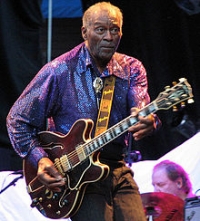
Charles Edward Anderson "Chuck" Berry (born October 18, 1926) is an American guitarist, singer, and songwriter, and one of the pioneers of rock and roll music. With songs such as "Maybellene" (1955), "Roll Over Beethoven" (1956), "Rock and Roll Music" (1957) and "Johnny B. Goode" (1958), Chuck Berry refined and developed rhythm and blues into the major elements that made rock and roll distinctive, with lyrics focusing on teen life and consumerism and utilizing guitar solos and showmanship that would be a major influence on subsequent rock music.
The Cab

The Cab is an American rock band from Las Vegas, Nevada. Their debut album, Whisper War, was released on April 29, 2008. They have been called "The Band You Need to Know 2008" by Alternative Press magazine. They were also featured in the '100 Bands You Need to Know in 2010' by the magazine and were one of the three bands featured on the cover page, along with Never Shout Never and Hey Monday. Their second album Symphony Soldier was released on August 23, 2011, with its first single "Bad" released to iTunes July 11, 2011, and announced by the band on July 18. The Cab funded the entire album by themselves and left their Fueled by Ramen/Decaydance label, self-releasing Symphony Soldier. AbsolutePunk gave an extremely positive review with a rating of 95%, calling the album a "masterpiece". The pre-orders in the band's webstore featured eleven packages, ranging from $10 to $9,999. Symphony Soldier is digitally available on iTunes, and only available as physical CDs from the band's webstore. The band's latest work, an EP titled Lock Me Up, was released on April 29, 2014. They have not released any new material since 2014, leaving the future of the band uncertain.
Green Day

Green Day is an American rock trio formed in 1987. The band has consisted of Billie Joe Armstrong (vocals, guitar), Mike Dirnt (bass guitar, vocals), and Tré Cool (drums, percussion) for the majority of its existence.
Green Day was originally part of the punk rock scene at 924 Gilman Street in Berkeley, California. Its early releases for independent record label Lookout! Records earned them a grassroots fanbase, some of whom felt alienated when the band signed to a major label.
The band has sold over 65 million records worldwide, They also have three Grammy Awards, Best Alternative Album for Dookie, Best Rock Album for American Idiot, and Record of the Year for "Boulevard of Broken Dreams".
Green Day was originally part of the punk rock scene at 924 Gilman Street in Berkeley, California. Its early releases for independent record label Lookout! Records earned them a grassroots fanbase, some of whom felt alienated when the band signed to a major label.
The band has sold over 65 million records worldwide, They also have three Grammy Awards, Best Alternative Album for Dookie, Best Rock Album for American Idiot, and Record of the Year for "Boulevard of Broken Dreams".
John Williams

John Towner Williams (born February 8, 1932) is an American composer, conductor, and pianist. In a career that spans six decades, Williams has composed many of the most famous film scores in Hollywood history, including Star Wars, Superman, Home Alone, the first three Harry Potter movies and all but two of Steven Spielberg's feature films including the Indiana Jones series, Schindler's List, E.T. the Extra-Terrestrial, Jurassic Park and Jaws. He also composed the soundtrack for the hit 1960s television series Lost in Space as well as the fanfare of the DreamWorks Pictures' logo.
Williams has composed theme music for four Olympic Games, the NBC Nightly News, the rededication of the Statue of Liberty, and numerous television series and concert pieces. He served as the principal conductor of the Boston Pops Orchestra from 1980 to 1993, and is now the orchestra's laureate conductor.
Williams is a five-time winner of the Academy Award. He has also won four Golden Globe Awards, seven BAFTA Awards and 21 Grammy Awards. With 45 Academy Award nominations, Williams is, together with composer Alfred Newman, the second most nominated person after Walt Disney. He was inducted into the Hollywood Bowl Hall of Fame in 2000, and was a recipient of the Kennedy Center Honors in 2004.
Williams has composed theme music for four Olympic Games, the NBC Nightly News, the rededication of the Statue of Liberty, and numerous television series and concert pieces. He served as the principal conductor of the Boston Pops Orchestra from 1980 to 1993, and is now the orchestra's laureate conductor.
Williams is a five-time winner of the Academy Award. He has also won four Golden Globe Awards, seven BAFTA Awards and 21 Grammy Awards. With 45 Academy Award nominations, Williams is, together with composer Alfred Newman, the second most nominated person after Walt Disney. He was inducted into the Hollywood Bowl Hall of Fame in 2000, and was a recipient of the Kennedy Center Honors in 2004.
Irving Berlin

Irving Berlin (May 11, 1888 – September 22, 1989) was a Russian-born American composer and lyricist, and one of the most prolific American songwriters in history. Berlin was one of the few Tin Pan Alley/Broadway songwriters who wrote both lyrics and music for his songs. Although he never learned to read music beyond a rudimentary level, with the help of various uncredited musical assistants or collaborators, he eventually composed over 3,000 songs, many of which (e.g. "God Bless America", "White Christmas", "Anything You Can Do", "There's No Business Like Show Business") left an indelible mark on music and culture worldwide. He composed seventeen film scores and twenty-one Broadway scores.
Keith Jarrett

Keith Jarrett (born May 8, 1945 in Allentown, Pennsylvania) is an American pianist and composer.
His career started with Art Blakey, Charles Lloyd and Miles Davis. Since the early 1970s he has enjoyed a great deal of success in both classical music and jazz, as a group leader and a solo performer. His improvisation technique combines not only jazz, but also other forms of music, especially classical, gospel, blues and ethnic folk music.
In 2003 he received the Polar Music Prize, being the first (and to this day only) recipient not sharing the prize with anyone else.
His career started with Art Blakey, Charles Lloyd and Miles Davis. Since the early 1970s he has enjoyed a great deal of success in both classical music and jazz, as a group leader and a solo performer. His improvisation technique combines not only jazz, but also other forms of music, especially classical, gospel, blues and ethnic folk music.
In 2003 he received the Polar Music Prize, being the first (and to this day only) recipient not sharing the prize with anyone else.
The Beatles

The Beatles were a pop and rock group from Liverpool, England formed in 1960. Primarily consisting of John Lennon (rhythm guitar, vocals), Paul McCartney (bass guitar, vocals), George Harrison (lead guitar, vocals) and Ringo Starr (drums, vocals) throughout their career, The Beatles are recognised for leading the mid-1960s musical "British Invasion" into the United States. Although their initial musical style was rooted in 1950s rock and roll and homegrown skiffle, the group explored genres ranging from Tin Pan Alley to psychedelic rock. Their clothes, styles, and statements made them trend-setters, while their growing social awareness saw their influence extend into the social and cultural revolutions of the 1960s. After the band broke up in 1970, all four members embarked upon solo careers.
The Beatles are one of the most commercially successful and critically acclaimed bands in the history of popular music, selling over a billion records internationally. In the United Kingdom, The Beatles released more than 40 different singles, albums, and EPs that reached number one, earning more number one albums (15) than any other group in UK chart history. This commercial success was repeated in many other countries; their record company, EMI, estimated that by 1985 they had sold over one billion records worldwide. According to the Recording Industry Association of America, The Beatles have sold more albums in the United States than any other band. In 2004, Rolling Stone magazine ranked The Beatles number one on its list of 100 Greatest Artists of All Time. According to that same magazine, The Beatles' innovative music and cultural impact helped define the 1960s, and their influence on pop culture is still evident today. In 2008, Billboard magazine released a list of top-selling Hot 100 artists to celebrate the chart's fiftieth anniversary; The Beatles reached #1 again.
The Beatles are one of the most commercially successful and critically acclaimed bands in the history of popular music, selling over a billion records internationally. In the United Kingdom, The Beatles released more than 40 different singles, albums, and EPs that reached number one, earning more number one albums (15) than any other group in UK chart history. This commercial success was repeated in many other countries; their record company, EMI, estimated that by 1985 they had sold over one billion records worldwide. According to the Recording Industry Association of America, The Beatles have sold more albums in the United States than any other band. In 2004, Rolling Stone magazine ranked The Beatles number one on its list of 100 Greatest Artists of All Time. According to that same magazine, The Beatles' innovative music and cultural impact helped define the 1960s, and their influence on pop culture is still evident today. In 2008, Billboard magazine released a list of top-selling Hot 100 artists to celebrate the chart's fiftieth anniversary; The Beatles reached #1 again.
Creedence Clearwater Revival
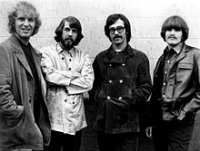
Creedence Clearwater Revival, also referred to as Creedence and CCR, was an American rock band that recorded and performed from 1959 to 1972 under various names before settling on the Creedence Clearwater Revival name in 1967. The band initially consisted of lead vocalist, lead guitarist, and primary songwriter John Fogerty; his brother, rhythm guitarist Tom Fogerty; bassist Stu Cook; and drummer Doug Clifford. These members had played together since 1959, first as the Blue Velvets and later as the Golliwogs.
Reborn!

Reborn!, known in Japan as Katekyō Hitman Reborn!, is a Japanese manga series written and illustrated by Akira Amano. It follows Tsunayoshi Sawada, a young boy who discovers that he is next in line to become boss of the Vongola family, a powerful Mafia organization.
Koen Dejonghe

Koen Dejonghe has held a position at the conservatory in Antwerp since 1986, teaching practical harmony and improvisation. He currently also gives classes in accompaniment, instrumental ensemble performance and harmony and counterpoint at the music academies of Sint-Niklaas and Antwerp.
Vivaldi

Antonio Lucio Vivaldi (March 4, 1678 â July 28, 1741), nicknamed il Prete Rosso ("The Red Priest"), was a Venetian priest and Baroque music composer, as well as a famous virtuoso violinist; he was born and raised in the Republic of Venice. The Four Seasons, a series of four violin concerti, is his best-known work and a highly popular Baroque piece.
Many of Vivaldi's compositions reflect a flamboyant, almost playful, exuberance. Most of Vivaldi's repertoire was rediscovered only in the first half of the 20th century in Turin and Genoa and was published in the second half. Vivaldi's music is innovative, breaking a consolidated tradition in schemes; he gave brightness to the formal and the rhythmic structure of the concerto, repeatedly looking for harmonic contrasts and innovative melodies and themes. Moreover, Vivaldi was able to compose nonacademic music, particularly meant to be appreciated by the wide public and not only by an intellectual minority. The joyful appearance of his music reveals in this regard a transmissible joy of composing; these are among the causes of the vast popularity of his music. This popularity soon made him famous in other countries such as France which was, at the time, very independent concerning its musical taste.
Vivaldi is considered one of the composers who brought Baroque music (with its typical contrast among heavy sonorities) to evolve into a classical style. Johann Sebastian Bach was deeply influenced by Vivaldi's concertos and arias (recalled in his Johannes Passion, Matthäuspassion, and cantatas). Bach transcribed a number of Vivaldi's concerti for solo keyboard, along with a number for orchestra, including the famous Concerto for Four Violins and Violoncello, Strings and Continuo (RV 580).
Many of Vivaldi's compositions reflect a flamboyant, almost playful, exuberance. Most of Vivaldi's repertoire was rediscovered only in the first half of the 20th century in Turin and Genoa and was published in the second half. Vivaldi's music is innovative, breaking a consolidated tradition in schemes; he gave brightness to the formal and the rhythmic structure of the concerto, repeatedly looking for harmonic contrasts and innovative melodies and themes. Moreover, Vivaldi was able to compose nonacademic music, particularly meant to be appreciated by the wide public and not only by an intellectual minority. The joyful appearance of his music reveals in this regard a transmissible joy of composing; these are among the causes of the vast popularity of his music. This popularity soon made him famous in other countries such as France which was, at the time, very independent concerning its musical taste.
Vivaldi is considered one of the composers who brought Baroque music (with its typical contrast among heavy sonorities) to evolve into a classical style. Johann Sebastian Bach was deeply influenced by Vivaldi's concertos and arias (recalled in his Johannes Passion, Matthäuspassion, and cantatas). Bach transcribed a number of Vivaldi's concerti for solo keyboard, along with a number for orchestra, including the famous Concerto for Four Violins and Violoncello, Strings and Continuo (RV 580).
Parade
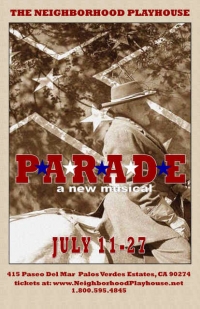
Parade is a musical with a book by Alfred Uhry and music and lyrics by Jason Robert Brown. The musical was first produced on Broadway at the Vivian Beaumont Theater on December 17, 1998. The production was directed by Harold Prince and closed 28 February 1999 after only 39 previews and 84 regular performances. It starred Brent Carver as Leo Frank, Carolee Carmello as Lucille Frank, and Christy Carlson Romano as Mary Phagan.
The musical won Tony Awards for best book and best score (out of nine nominations) and six Drama Desk Awards. The show has enjoyed a U.S. national tour and numerous professional and amateur productions both in the U.S. and abroad.
The musical won Tony Awards for best book and best score (out of nine nominations) and six Drama Desk Awards. The show has enjoyed a U.S. national tour and numerous professional and amateur productions both in the U.S. and abroad.
Franz Schubert

Franz Peter Schubert (German pronunciation: ; January 31, 1797 – November 19, 1828) was an Austrian composer. He wrote some 600 Lieder, nine symphonies (including the famous "Unfinished Symphony"), liturgical music, operas, some incidental music, and a large body of chamber and solo piano music. He is particularly noted for his original melodic and harmonic writing.
Schubert was born into a musical family, and received formal musical training through much of his childhood. While Schubert had a close circle of friends and associates who admired his work (amongst them the prominent singer Johann Michael Vogl), wide appreciation of his music during his lifetime was limited at best. He was never able to secure adequate permanent employment, and for most of his career he relied on the support of friends and family. He made some money from published works, and occasionally gave private musical instruction. In the last year of his life he began to receive wider acclaim. He died at the age of 31 of "typhoid fever", a diagnosis which was vague at the time; several scholars suspect the real illness was tertiary syphilis.
Interest in Schubert's work increased dramatically in the decades following his death. Composers like Franz Liszt, Robert Schumann and Felix Mendelssohn discovered, collected, and championed his works in the 19th century, as did musicologist Sir George Grove. Franz Schubert is now widely considered to be one of the greatest composers in the Western tradition.
Schubert was born into a musical family, and received formal musical training through much of his childhood. While Schubert had a close circle of friends and associates who admired his work (amongst them the prominent singer Johann Michael Vogl), wide appreciation of his music during his lifetime was limited at best. He was never able to secure adequate permanent employment, and for most of his career he relied on the support of friends and family. He made some money from published works, and occasionally gave private musical instruction. In the last year of his life he began to receive wider acclaim. He died at the age of 31 of "typhoid fever", a diagnosis which was vague at the time; several scholars suspect the real illness was tertiary syphilis.
Interest in Schubert's work increased dramatically in the decades following his death. Composers like Franz Liszt, Robert Schumann and Felix Mendelssohn discovered, collected, and championed his works in the 19th century, as did musicologist Sir George Grove. Franz Schubert is now widely considered to be one of the greatest composers in the Western tradition.
Johann Strauss

Johann Strauss I (March 14, 1804 – September 25, 1849; German: Johann Baptist Strauß, Johann Strauss (Vater); also Johann Baptist Strauss, Johann Strauss, Sr., the Elder, the Father), born in Vienna, was an Austrian Romantic composer famous for his waltzes, and for popularizing them alongside Joseph Lanner, thereby setting the foundations for his sons to carry on his musical dynasty. His most famous piece is probably the Radetzky March (named after Joseph Radetzky von Radetz), while his most famous waltz is probably the Lorelei Rheinklänge, Op. 154.
Joshua Redman
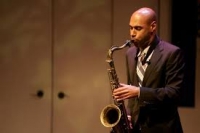
Joshua Redman was born in Berkeley, California, to jazz saxophonist Dewey Redman and dancer and librarian Renee Shedroff. He is Jewish. He was exposed to many kinds of music at the Center for World Music in Berkeley, where his mother studied South Indian dance. Some of his earliest lessons in music and improvisation were on recorder with gamelan player Jody Diamond. He was exposed at an early age to a variety of musics and instruments and began playing clarinet at age nine before switching to what became his primary instrument, the tenor saxophone, one year later. Redman cites John Coltrane, Ornette Coleman, Cannonball Adderley, his father Dewey Redman, as well as the Beatles, Aretha Franklin, the Temptations, Earth, Wind and Fire, Prince, the Police and Led Zeppelin as musical influences.
Rusty Goodman
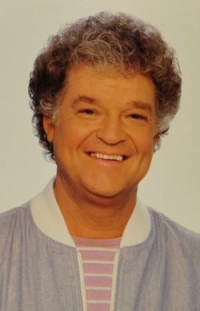
Charles F. "Rusty" Goodman (September 2, 1933 – November 11, 1990) was an American singer/songwriter in the Southern Gospel Music industry. He was a prolific composer whose many songs included "Standing in the Presence of the King", "Leavin' On My Mind", "Home", "John the Revelator", "Touch the Hand of the Lord", "Had it Not Been" "I Believe He's Coming Back" "Look for Me" and "Who Am I?" His songs have been covered by many of the top artists in the music industry including Elvis Presley, The Imperials, J. D. Sumner & The Stamps Quartet, The Speers, The Happy Goodman Family, Michael English and Gaither Vocal Band.
Claudio Bertrami
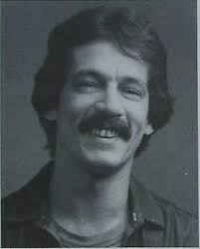
Claudio Bertrami Musical artist Songs Medusa Grupo Medusa · 1981 Pouso em Congonhas Ferrovias · 1983 Aduba-Lé
Ferrovias · 1983
Ferrovias · 1983
Hillsong Worship

Hillsong Worship is an Australian Christian music praise & worship group from Sydney, Australia, where they started making music in 1983, at Hillsong Church. Twelve have charted on the Billboard magazine charts in the US
Tarja Turunen

Tarja Soile Susanna Turunen-Cabuli, known professionally as Tarja Turunen or simply Tarja, is a Finnish heavy metal singer-songwriter. She is a soprano with a three and a half octave range. Turunen studied singing at Sibelius Academy and Hochschule für Musik Karlsruhe.
Moulin Rouge!

Moulin Rouge! is a 2001 musical film directed by Baz Luhrmann, based largely on the Giuseppe Verdi opera La Traviata. It tells the story of a young British poet/writer, Christian, who falls in love with the star of the Moulin Rouge, cabaret actress and courtesan Satine, played by Ewan McGregor and Nicole Kidman, respectively. It uses the musical setting of the Montmartre Quarter of Paris, France. The film was nominated for eight Oscars, including Best Picture, and won two: for art direction and costume design. It was shot at Fox Studios in Sydney, Australia.
In 2006, Moulin Rouge! ranked twenty-fifth on the American Film Institute's list of best musicals.
In 2006, Moulin Rouge! ranked twenty-fifth on the American Film Institute's list of best musicals.
Liszt

Franz Liszt (October 22, 1811 – July 31, 1886) was a Hungarian composer, virtuoso pianist and teacher.
Liszt became renowned throughout Europe for his great skill as a performer; to this day, many consider him to have been the greatest pianist in history. He was also an important and influential composer, a notable piano teacher, a conductor who contributed significantly to the modern development of the art, and a benefactor to other composers and performers, notably Richard Wagner and Hector Berlioz.
As a composer, Liszt was one of the most prominent representatives of the "Neudeutsche Schule" ("New German School"). He left behind a huge and diverse oeuvre, in which he influenced his forward-looking contemporaries and anticipated some 20th-century ideas and trends. Some of his most notable contributions were the invention of the symphonic poem, developing the concept of thematic transformation as part of his experiments in musical form and making radical departures in harmony.
Liszt has most frequently been credited to have been the first pianist who gave concerts with programs consisting only of solo pieces. An example is a concert he gave on March 9, 1839, at the Palazzo Poli in Rome. Since Liszt could not find singers who — following the usual habit of the time — should have completed the program, he played four numbers all alone.
Liszt was a prolific composer. Most of his music is for the piano and much of it requires formidable technique.In his most famous and virtuosic works, he is the archetypal Romantic composer. Liszt pioneered the technique of thematic transformation, a method of development which was related to both the existing variation technique and to the new use of the Leitmotif by Richard Wagner. Liszt's piano works are usually divided into two classes. On the one hand, there are "original works", and on the other hand "transcriptions", "paraphrases" or "fantasies" on works by other composers.
Liszt became renowned throughout Europe for his great skill as a performer; to this day, many consider him to have been the greatest pianist in history. He was also an important and influential composer, a notable piano teacher, a conductor who contributed significantly to the modern development of the art, and a benefactor to other composers and performers, notably Richard Wagner and Hector Berlioz.
As a composer, Liszt was one of the most prominent representatives of the "Neudeutsche Schule" ("New German School"). He left behind a huge and diverse oeuvre, in which he influenced his forward-looking contemporaries and anticipated some 20th-century ideas and trends. Some of his most notable contributions were the invention of the symphonic poem, developing the concept of thematic transformation as part of his experiments in musical form and making radical departures in harmony.
Liszt has most frequently been credited to have been the first pianist who gave concerts with programs consisting only of solo pieces. An example is a concert he gave on March 9, 1839, at the Palazzo Poli in Rome. Since Liszt could not find singers who — following the usual habit of the time — should have completed the program, he played four numbers all alone.
Liszt was a prolific composer. Most of his music is for the piano and much of it requires formidable technique.In his most famous and virtuosic works, he is the archetypal Romantic composer. Liszt pioneered the technique of thematic transformation, a method of development which was related to both the existing variation technique and to the new use of the Leitmotif by Richard Wagner. Liszt's piano works are usually divided into two classes. On the one hand, there are "original works", and on the other hand "transcriptions", "paraphrases" or "fantasies" on works by other composers.
Eric Coates
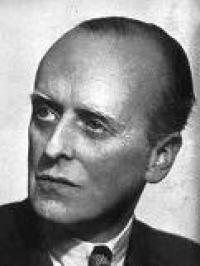
Eric Coates (27 August 1886 – 21 December 1957) was an English composer of light music and a viola player.
Johann Pachelbel

Johann Pachelbel (pronounced /ˈpækəlbɛl/, /ˈpɑːkəlbɛl/, or /ˈpɑːkəbɛl/; baptized September 1, 1653 – buried March 9, 1706) was a German Baroque composer, organist and teacher, who brought the south German organ tradition to its peak. He composed a large body of sacred and secular music, and his contributions to the development of the chorale prelude and fugue have earned him a place among the most important composers of the middle Baroque era.
Pachelbel's work enjoyed enormous popularity during his lifetime; he had many pupils and his music became a model for the composers of south and central Germany. Today, Pachelbel is best known for the Canon in D, the only canon he wrote - although a true canon at the unison in three parts, it is often regarded more as a passacaglia, and it is in this mode that it has been arranged and transcribed for many different media. In addition to the canon, his most well-known works include the Chaconne in F minor, the Toccata in E minor for organ, and the Hexachordum Apollinis, a set of keyboard variations.
Pachelbel's music was influenced by southern German composers, such as Johann Jakob Froberger and Johann Kaspar Kerll, Italians such as Girolamo Frescobaldi and Alessandro Poglietti, French composers, and the composers of the Nuremberg tradition. Pachelbel preferred a lucid, uncomplicated contrapuntal style that emphasized melodic and harmonic clarity. His music is less virtuosic and less adventurous harmonically than that of Dieterich Buxtehude, although, like Buxtehude, Pachelbel experimented with different ensembles and instrumental combinations in his chamber music and, most importantly, his vocal music, much of which features exceptionally rich instrumentation. Pachelbel explored many variation forms and associated techniques, which manifest themselves in various diverse pieces, from sacred concertos to harpsichord suites.
Pachelbel's work enjoyed enormous popularity during his lifetime; he had many pupils and his music became a model for the composers of south and central Germany. Today, Pachelbel is best known for the Canon in D, the only canon he wrote - although a true canon at the unison in three parts, it is often regarded more as a passacaglia, and it is in this mode that it has been arranged and transcribed for many different media. In addition to the canon, his most well-known works include the Chaconne in F minor, the Toccata in E minor for organ, and the Hexachordum Apollinis, a set of keyboard variations.
Pachelbel's music was influenced by southern German composers, such as Johann Jakob Froberger and Johann Kaspar Kerll, Italians such as Girolamo Frescobaldi and Alessandro Poglietti, French composers, and the composers of the Nuremberg tradition. Pachelbel preferred a lucid, uncomplicated contrapuntal style that emphasized melodic and harmonic clarity. His music is less virtuosic and less adventurous harmonically than that of Dieterich Buxtehude, although, like Buxtehude, Pachelbel experimented with different ensembles and instrumental combinations in his chamber music and, most importantly, his vocal music, much of which features exceptionally rich instrumentation. Pachelbel explored many variation forms and associated techniques, which manifest themselves in various diverse pieces, from sacred concertos to harpsichord suites.
Bon Jovi
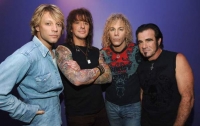
Bon Jovi is a rock band from Sayreville, New Jersey. Fronted by lead singer and namesake Jon Bongiovi, the group originally achieved large-scale success in the 1980s. Over the past 25 years, Bon Jovi has sold over 120 million albums worldwide, including 34 million in the United States alone.
Bon Jovi formed in 1983 with lead singer Jon Bon Jovi, guitarist Richie Sambora, keyboardist David Bryan, bassist Alec John Such, and drummer Tico Torres. Other than the departure of Alec John Such in 1994 (which pared the lineup down to a quartet), the lineup has remained the same for the past 25 years. After two moderately successful albums in 1984 and 1985, the band scored big with Slippery When Wet (1986) and New Jersey (1988), which sold a combined 19 million copies in the U.S. alone, charted eight Top Ten hits (including four number one hits), and launched the band into global super stardom. After non-stop touring, the band went on hiatus after the New Jersey Tour in 1990, during which time Jon Bon Jovi and Richie Sambora both released successful solo albums. In 1992, the band returned with the double platinum Keep the Faith and has since created a string of platinum albums throughout the 1990s and 2000s.
In 2006, the band won a Grammy for best Country Collaboration for "Who Says You Can't Go Home" with Jennifer Nettles from Sugarland and also became the first rock band to reach #1 on the Hot Country Songs chart with the same song. The band has also received multiple Grammy nominations for music from the albums Crush, Bounce, and Lost Highway.
Throughout their career, the band has released ten studio albums, of which nine have gone platinum. In addition, the band has charted 19 singles to the Top 40 of the Billboard Hot 100, four of which reached #1 ("You Give Love a Bad Name", "Livin' on a Prayer", "Bad Medicine", and "I'll Be There for You"). The band also holds the record for the most weeks for a hard rock album at #1 on the Billboard 200 with Slippery When Wet, as well as the most Top 10 singles from a hard rock album, with New Jersey, which charted five such singles.
Bon Jovi formed in 1983 with lead singer Jon Bon Jovi, guitarist Richie Sambora, keyboardist David Bryan, bassist Alec John Such, and drummer Tico Torres. Other than the departure of Alec John Such in 1994 (which pared the lineup down to a quartet), the lineup has remained the same for the past 25 years. After two moderately successful albums in 1984 and 1985, the band scored big with Slippery When Wet (1986) and New Jersey (1988), which sold a combined 19 million copies in the U.S. alone, charted eight Top Ten hits (including four number one hits), and launched the band into global super stardom. After non-stop touring, the band went on hiatus after the New Jersey Tour in 1990, during which time Jon Bon Jovi and Richie Sambora both released successful solo albums. In 1992, the band returned with the double platinum Keep the Faith and has since created a string of platinum albums throughout the 1990s and 2000s.
In 2006, the band won a Grammy for best Country Collaboration for "Who Says You Can't Go Home" with Jennifer Nettles from Sugarland and also became the first rock band to reach #1 on the Hot Country Songs chart with the same song. The band has also received multiple Grammy nominations for music from the albums Crush, Bounce, and Lost Highway.
Throughout their career, the band has released ten studio albums, of which nine have gone platinum. In addition, the band has charted 19 singles to the Top 40 of the Billboard Hot 100, four of which reached #1 ("You Give Love a Bad Name", "Livin' on a Prayer", "Bad Medicine", and "I'll Be There for You"). The band also holds the record for the most weeks for a hard rock album at #1 on the Billboard 200 with Slippery When Wet, as well as the most Top 10 singles from a hard rock album, with New Jersey, which charted five such singles.
Thomas Tallis

Thomas Tallis (c. 1505 – 23 November 1585) was an English composer. Tallis flourished as a church musician in 16th century Tudor England. He occupies a primary place in anthologies of English church music, and is considered among the best of England's early composers. He is honoured for his original voice in English musicianship. No contemporary portrait of Tallis survives: the earliest, painted by Gerard van der Gucht, dates from 150 years after Tallis died, and there is no certainty that it is a likeness.
Bach

Johann Sebastian Bach (31 March 1685 – 28 July 1750) was a German composer and organist whose sacred and secular works for choir, orchestra, and solo instruments drew together the strands of the Baroque period and brought it to its ultimate maturity. Although he introduced no new forms, he enriched the prevailing German style with a robust contrapuntal technique, an unrivalled control of harmonic and motivic organisation in composition for diverse musical forces, and the adaptation of rhythms and textures from abroad, particularly Italy and France.
Revered for their intellectual depth and technical and artistic beauty, Bach's works include the Brandenburg concertos; the Goldberg Variations; the English Suites, French Suites, Partitas, and Well-Tempered Clavier; the Mass in B Minor; the St. Matthew Passion; the St. John Passion; The Musical Offering; The Art of Fugue; the Sonatas and Partitas for violin solo; the Cello Suites; more than 200 surviving cantatas; and a similar number of organ works, including the celebrated Toccata and Fugue in D Minor.
While Bach's fame as an organist was great during his lifetime, he was not particularly well-known as a composer. His adherence to Baroque forms and contrapuntal style was considered "old-fashioned" by his contemporaries, especially late in his career when the musical fashion tended towards Rococo and later Classical styles. A revival of interest and performances of his music began early in the 19th century, and he is now widely considered to be one of the greatest composers in the Western tradition.
Revered for their intellectual depth and technical and artistic beauty, Bach's works include the Brandenburg concertos; the Goldberg Variations; the English Suites, French Suites, Partitas, and Well-Tempered Clavier; the Mass in B Minor; the St. Matthew Passion; the St. John Passion; The Musical Offering; The Art of Fugue; the Sonatas and Partitas for violin solo; the Cello Suites; more than 200 surviving cantatas; and a similar number of organ works, including the celebrated Toccata and Fugue in D Minor.
While Bach's fame as an organist was great during his lifetime, he was not particularly well-known as a composer. His adherence to Baroque forms and contrapuntal style was considered "old-fashioned" by his contemporaries, especially late in his career when the musical fashion tended towards Rococo and later Classical styles. A revival of interest and performances of his music began early in the 19th century, and he is now widely considered to be one of the greatest composers in the Western tradition.
Dan Schutte
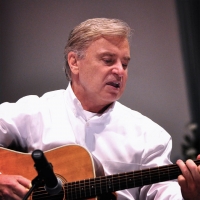
Daniel Laurent Schutte is an American composer of Catholic liturgical music and a contemporary Christian songwriter best known for composing the hymn "Here I Am, Lord" (1981, also known as "I, the Lord of Sea and Sky") and over 150 popular hymns and Mass settings.
Friedrich Wieck
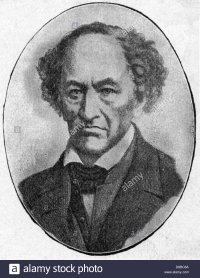
Johann Gottlob Friedrich Wieck (18 August 1785 – 6 October 1873, aged 88) was a noted German piano teacher, voice teacher, owner of a piano store, and author of essays and music reviews. He is remembered as the teacher of his daughter, Clara, a child prodigy who was undertaking international concert tours by age eleven and who later married her father's pupil Robert Schumann, in defiance of her father's extreme objections. As Clara Schumann, she became one of the most famous pianists of her time. Another of Wieck's daughters, Marie Wieck, also had a career in music, although not nearly so illustrious as Clara's. Other pupils included Hans von Bülow.
Vanessa Carlton
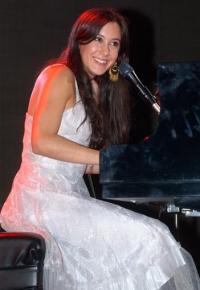
Vanessa Lee Carlton (born August 16, 1980) is an American soft rock/Piano pop singer, songwriter, and pianist best known for the Billboard top five, Grammy-nominated single "A Thousand Miles" from her debut album, Be Not Nobody which was released April 30, 2002, and certified platinum in the U.S.
Her music, along with that of her contemporary Michelle Branch to whom she is sometimes compared, has had an influence on female solo pop singer-songwriters in the 21st century, including Kate Voegele, Lights, Sara Bareilles (another piano pop artist), Colbie Caillat and Tristan Prettyman.
Carlton's second album, Harmonium (released November 9, 2004), debuted at number 33 on the U.S. Billboard 200 and had sold 179,000 copies as of February 2006, with the single "White Houses," peaking at 86 in the U.S. Billboard Hot 100. She subsequently parted company from her record label A&M, though she still holds a dedicated fanbase.
Her third album, Heroes and Thieves, was released on October 9, 2007 by the The Inc./Universal Motown record labels.
Her music, along with that of her contemporary Michelle Branch to whom she is sometimes compared, has had an influence on female solo pop singer-songwriters in the 21st century, including Kate Voegele, Lights, Sara Bareilles (another piano pop artist), Colbie Caillat and Tristan Prettyman.
Carlton's second album, Harmonium (released November 9, 2004), debuted at number 33 on the U.S. Billboard 200 and had sold 179,000 copies as of February 2006, with the single "White Houses," peaking at 86 in the U.S. Billboard Hot 100. She subsequently parted company from her record label A&M, though she still holds a dedicated fanbase.
Her third album, Heroes and Thieves, was released on October 9, 2007 by the The Inc./Universal Motown record labels.
 Sheet Music Max is a site for those who wants to access popular sheet music easily,
letting them download the sheet music for free for trial purposes.
It's completely free to download and try the listed sheet music, but you have to delete the files after 24 hours of trial.
Don't forget, if you like the piece of music you have just learned playing,
treat the artist with respect, and go buy the original sheet music.
Sheet Music Max is a site for those who wants to access popular sheet music easily,
letting them download the sheet music for free for trial purposes.
It's completely free to download and try the listed sheet music, but you have to delete the files after 24 hours of trial.
Don't forget, if you like the piece of music you have just learned playing,
treat the artist with respect, and go buy the original sheet music.